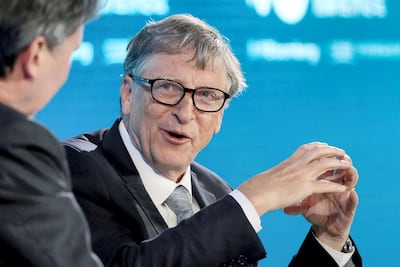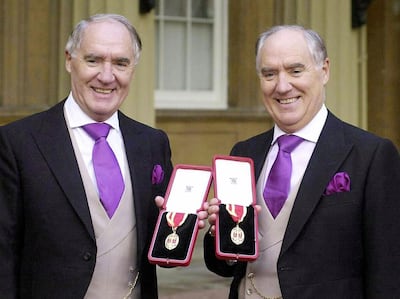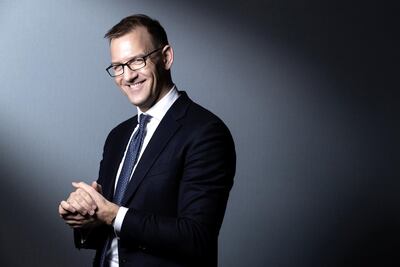Shunji Sugaya
A Japanese company founder who turned down an offer from SoftBank to buy his start-up idea when he was 23 is now set to become a billionaire.
In 2000, Shunji Sugaya won an award at a business contest where SoftBank founder Masayoshi Son was a judge.
He sent Mr Son an email to thank him and the two met. Before long, SoftBank offered to buy Mr Sugaya's idea for $2.8 million (Dh10.28m) or convince him to join the company and receive stock options.
Mr Sugaya turned it down.
“It gave me a big boost in confidence as I was a student – I was so happy I could dance,” he said. “We were very grateful for the offer but we politely declined and decided to do it ourselves.”
So Mr Sugaya started his own company, Optim, which now provides business management platforms using artificial intelligence and Internet of Things technology.
The bet paid off, with Mr Sugaya moving ever closer to joining the ranks of billionaires in Japan alongside Mr Son.
Optim’s shares have gained 79 per cent this year and Mr Sugaya’s net worth, derived mainly from his stake of about 64 per cent in the company, has surged to about $990m, according to a calculation by the Bloomberg Billionaires Index that excludes shares pledged as collateral.
The coronavirus has hastened a shift from analogue to digital business practices at companies in Japan, according to Mr Sugaya, 43, who is Optim’s president.
“Digitisation has progressed at great speed during the past three months,” he said. “It feels like quite a tailwind.”
Mr Sugaya was a computer programmer as far back as elementary school, when he created games and sold them to his friends for a few hundred yen.
Optim, which he founded in 2000, started out providing internet video-advertising services.
It got into AI and IoT as it worked with telecoms company Nippon Telegraph & Telephone Corporation to create an internet connection service.
Optim’s technologies, which have since expanded to include remote control support tools, are now used in industries including construction, health care, retail and finance.
Major business partners include SoftBank, Japanese telecoms operator KDDI and manufacturing multinational Komatsu, according to the company’s website.
The company posted revenue of $62.5m in its last fiscal year, and made $1.1m in profit. It has a market value of about $1.6 billion.
“I really don’t care” about the money, Mr Sugaya said. “In 20 years, I want us to be a company that people would point to and say, ‘Optim changed all kinds of industries with AI and IoT’.”

Bill Gates
Bill Gates, already the world’s second-richest person, received an added boost as his investment in used-car platform Vroom more than doubled on the company’s first day of trading.
Shares of New York-based Vroom soared 118 per cent on Tuesday, lifting the value of Mr Gates’s holding of about 6 per cent by more than $175m.
The stock climbed again Wednesday, advancing 16 per cent to $55.44. It lost some of its gains in the market rout, closing on Thursday at $45.60.
Mr Gates, 64, who owns the stake through Cascade Investment, has a net worth of $115.1bn, according to the Bloomberg Billionaires Index.
The Microsoft co-founder trails only Amazon’s Jeff Bezos, whose fortune has increased by $41.3bn this year and now stands at $156.2bn.
Vroom, which sells used vehicles online, is also backed by L Catterton, General Catalyst Partners and T Rowe Price Associates.
While demand for used cars has weakened during the pandemic, Vroom sold more units in March and April than in any previous two-month period, according to filings.

Trevor Milton
The founder of Tesla competitor Nikola saw his fortune grow to $9bn after shares of the electric lorry company more than doubled.
The company's shares rose 104 per cent on its third day of trading on the Nasdaq after a reverse merger with VectoIQ Acquisition Corporation.
Trevor Milton, Nikola’s chairman and founder, has already set lofty goals.
The company, which also makes hydrogen-powered lorries, said last week that pre-orders for its vehicles topped $10bn and it expects to start generating revenue in 2021.
The stock rose higher on Monday after Mr Milton tweeted that the company would begin taking reservations for its zero-emission lorry, called the Badger, later this month.
Mr Milton is worth $7.1bn as of Thursday, according to Forbes.
Investor interest in Nikola is growing.
The Phoenix company has a $26.3bn market valuation, compared to around $3bn in a 2019 fundraising.
However, Nikola may struggle to create infrastructure such as hydrogen-refuelling stations for its fuel-cell vehicles.

David and Frederick Barclay
David Barclay’s sons will pay damages to their uncle, David’s twin brother Frederick, after admitting to bugging him at the Ritz Hotel in London.
Alistair Barclay “thought it necessary” to record Frederick and his daughter Amanda Barclay’s private conversations at the hotel because he “was very troubled” that the two posed “a significant risk of harm to his brothers Aidan and Howard Barclay”, and their interests, a lawyer for the sons said in a filing on June 8.
David Barclay’s sons will pay general damages for misuse of private information and breaches of confidence, the lawyer said.
They will attempt to agree to the levels of compensation privately, but will seek a judge’s ruling if they fail, the lawyer said.
The admissions may be an attempt to resolve a legal spat that has opened a window into the relationship between the reclusive billionaire twins.
The Barclay clan controls the Daily Telegraph newspaper and other businesses at the heart of the UK establishment.
"We do not dispute that the recordings were made and discussed between us," David's sons said on Monday.
“We did not conspire to injure any business or financial interest of Sir Frederick or Amanda. That was never our intention and there was no conspiracy as alleged.”
They contest Frederick and Amanda’s claims that they suffered economic loss as a result of the recordings and say they are applying to the court for those claims to be struck out.
Alistair Barclay purchased an “off-the-shelf” recording device from a central London shop, according to the filing.
The bug was put in the conservatory at the Ritz in early November until mid-January, according to the filing. The bug was placed to capture private discussions between Frederick and Amanda, who were negotiating the sale of the historic hotel near Buckingham Palace.
Frederick Barclay declined to comment on his nephew's defence.
The Ritz was sold for around £800m (Dh3.72 trillion) in March.
Daniel Kretinsky
Daniel Kretinsky’s bet on Macy’s turned out to be short but profitable, and the Czech billionaire might jump back into the stock again if the price is right.
His company Vesa Equity Investment said on Tuesday it owned 0.7 per cent of the US department-store chain, down from the 5 per cent stake unveiled less than a month ago.
The investment, billed as a strategic move at the time, coincided with a 65 per cent surge in the stock.
Mr Kretinsky made roughly $36m if he bought Macy’s shares the day before disclosing his 5 per cent stake and sold them on Tuesday.
“The reason for our exit certainly isn’t lack of confidence in the company’s future or in the management’s abilities,” said Vesa Equity spokesman Daniel Castvaj.
“We will continue closely watching Macy’s and the US retail market in general and we are not ruling out returning among the shareholders of this company.”
Macy’s is beginning to reopen stores following weeks of lockdowns.
The company just reported a 45 per cent quarterly sales slump and a net loss of $630m.
Despite the recent rebound, the stock has fallen about 48 per cent this year. It was removed from the benchmark S&P 500 Index in March, and Fitch cut the company’s credit rating to junk in April.
Mr Kretinsky is known for making contrarian bets, and he has had a few in the retail sector.
Just a week after he disclosed his Macy’s stake, Vesa announced it owned 6 per cent of Foot Locker, another US retailer hard hit by the coronavirus pandemic.
The billionaire also amassed shares of French grocer Casino Guichard-Perrachon last year as it reeled from a long fight with short sellers. That move came after a $6.5bn takeover offer for German wholesaler Metro was rebuffed.


